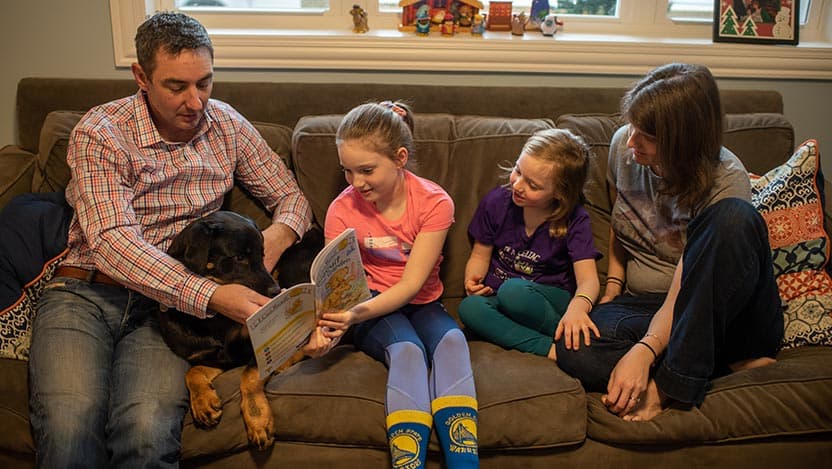Chicago family finds the best celiac disease care for their daughter

The Bourkes read Niamh's favorite book.
Early on, Renee Bourke, northwest side mom of two, noticed that her youngest daughter, Niamh, was having a tough time with foods. She would vomit after drinking her organic formula, which got better when Bourke switched to a gluten-free brand. However, it later became apparent that Niamh’s stomach troubles were representative of a larger issue, especially when she started eating solids.
“I turned to Dr. Google, saw celiac disease and knew that was it,” Bourke said.
Celiac disease is an inherited autoimmune disease that affects the digestive process. According to the Ritu Verma, MD, medical director of the University of Chicago Medicine Comer Children’s Hospital.

As a pediatric gastroenterology patient with celiac disease, the Bourkes were assigned a care team comprised of a physician, nurse and dietitian that works with the family to provide medical care and guidance.
“After we come to an official diagnosis, the entire team is in the same room, listening to the family, providing education and support,” Verma said.
Verma and team are poised to provide education and wraparound medical services for patients and their families that can take them from testing to treatment and from childhood through adulthood.
Managing celiac disease treatment as a family
It is those wraparound services that Bourke found comforting when learning how to manage Niamh’s diagnosis and how to tackle one menu for Niamh’s gluten-free diet and another for the rest of her family.
Now, Niamh is six years old, healthy and no longer suffering symptoms. The family has adjusted to making exceptions for Niamh’s diet and mom has grown accustomed to preparing gluten-free dishes. When the family added a new member to the family, a pet dog, they called the Celiac Disease Center about his diet with worry that he’ll get close to Niamh.
“We didn’t even think about it until we had to buy dog food, but we called the office and they helped us figure it out,” Bourke said.
Celiac Disease Treatment
The mission of The University of Chicago Celiac Disease Center is to cure celiac disease. Through our groundbreaking research, we’re striving to identify new treatments for celiac disease and find a cure. We also strive to raise awareness and diagnosis rates through education and advocacy.
Learn more about celiac disease